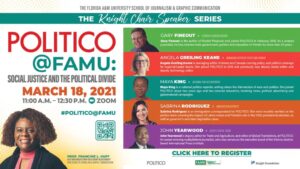
The 2020 racial reckoning in the United States and the hotly contested presidential election became personal for Sabrina Rodriguez, a reporter for POLITCO. Her interest in covering these events began with her own family.
“Covering the 2020 election actually started because I was seeing so much disinformation that was affecting Spanish language voters and communities in the U.S. and in my hometown of Miami,” Rodriguez said. “I kept noticing my aunt posting things that were completely outrageous about Joe Biden on Facebook.”
Rodriguez took it upon herself to work with her team to configure ways to cover the many communities being affected and how disinformation can impact naive voters.
Rodriguez was one of five reporters with POLITICO who took part in a Thursday panel discussion hosted by Francine Huff, Knight Chair for Student Achievement at Florida A&M University’s School of Journalism and Graphic Communication. The event was focused on “Social Justice and the Political Divide.”
This panel discussion featured journalists from POLITICO, a news source committed to delivering news on politics and policy.
In addition to Rodriguez, the panel included Gary Fineout, a Tallahassee-based reporter with POLITICO; Angela Greiling Keane, managing editor of states and Canada; John Yearwood, deputy editor for trade and agriculture and editor of global translations; and Maya King, national politics reporter.
The discussion centered on the racial unrest that took place over the summer and the 2020 presidential election. When discussing the impact these journalists can make on their community, King noted how important it was to be in these communities covering accurately how everything was affecting them.
“It’s really interesting diving into defunding the police in a literal way and seeing how these communities will be impacted,” King said.
Deeper into the conversation Yearwood stressed the importance of student journalists getting into this industry at such a pivotal moment.
“There are obstacles with anything,” Yearwood said. “You have to really want to do this. There are so many opportunities to get into journalism and we’re seeing more young people brought into journalism than ever before.”
As the event continued Fineout dived into the political discourse surrounding journalism jargon and how we can no longer afford to have this coded language surrounding politics. For many journalists there has always been a challenge to tell it how it is. He emphasized how important it is that we “get over our apprehensions about how to handle [politics and name calling]. This was a large issue many journalists faced the past four years navigating Donald Trump’s presidency.
“We have to be as completely transparent as we can and not let the spin distract us,” Fineout added.
At the end of the event, Rodriguez left viewers with sound advice about the benefits of connecting with your peers.
“Don’t look at each other as competition,” Rodriguez said. “These will be your colleagues, these are the friends that are going to help you get jobs in the newsroom, it’s not about one of us getting there but all of us.”
Mia Uzzell, a sophomore in the SJGC program, attended the event and plans to follow Rodriguez’s advice moving forward.
“It’s so important to network horizontally,” Uzzel said. “So often we think about trying to climb the ranks while the people next to us are just as important as the people above us.”